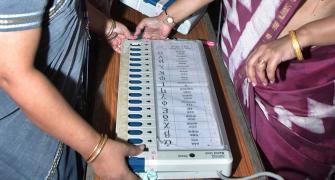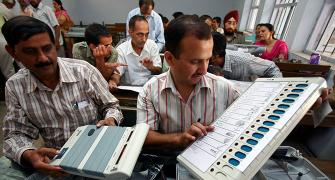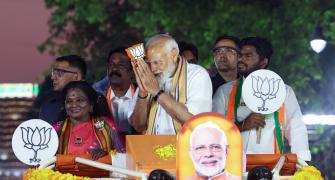The boom in engineering studies in India is fast catching up with China.
China is today the largest producer of engineering graduates in the world, with some 600,000 passing out of its colleges and universities last year.
India, it seems, isn't far behind.
According to the All India Council for Technical Education, India produced 401,791 engineers in 2003-04, 35 per cent being computer engineers. In 2004-05, the number of engineering graduates increased to 464,743, of which 31 per cent were computer engineers.
Compared to India and China, the United States produces only 70,000 engineering graduates every year. All of Europe produces just 100,000.
So, will India overtake China over the next few years? "It is quite possible," says K S Madhavan, retired professor at an engineering institute. "It is a matter of great satisfaction that India has been promoting engineering education in the country over the last few years. During our time, there were only a handful of institutes." He believes there is now an engineering boom in India. "I am sure that, with the number of institutes set up for various disciplines every year, India can easily overtake China."
India currently has 113 universities and 2,088 colleges, many of which teach various engineering disciplines. Engineering colleges in the country have been growing at 20 per cent a year, while business schools have grown at 60 per cent.
Five Indian states -- Tamil Nadu, Andhra Pradesh, Maharashtra, Karnataka and Kerala -- account for 69 per cent of India's engineers. Uttar Pradesh, Bihar, Gujarat, Rajasthan and Orissa account for only 14 per cent.
But despite the rise in colleges, Prof Madhavan says the quality of Indian engineers is questionable on account of "the lack of trained faculty and dismal state spending on research and development in higher education." As engineering education grows, he adds, its quality has to improve.
According to the National Institute of Education Planning & Administration, the share of government expenditure on technical education presently hovers around 4 per cent. In China, the amount spent on research and development, especially in engineering fields, is a good 10 per cent.
What, apart from poor government expenditure, could slow India down? Experts say one of the biggest drawbacks is overlapping. "We have degrees like a Bachelor of Computer Applications (BCA), Master of Computer Applications (MCA), Bachelor of Engineering or Technology (BE/B.Tech.) in computer science, BE/B.Tech. in information technology, Bachelor of Science in computer science, Master of Science in computer science and an integrated M.Sc. in computer science /software engineering," says C R Muthukrishnan, Department of Computer Science and Engineering, IIT-Madras.
In terms of curricula, he says, these programmes are highly overlapping. They attempt to be everything to everyone. "Today, MCA programmes are available in engineering institutes as well as in colleges of arts and science," he points out.
Experts add that implementation of the curriculum -- for degree programmes in computing across Indian engineering colleges -- also tend to be poor. Another drawback is the negligible infrastructure these institutes possess. For instance, there is a severe shortage of competent faculty in computer science/IT across all engineering institutes in India.
A year ago, the U R Rao Committee that studied the problems afflicting engineering and higher education in India said that, to improve research and development, India needs well over 10,000 Ph.Ds and twice as many M.Tech. degree holders. Currently, India produces barely 400 engineering Ph.Ds a year, mostly from the IITs and the Indian Institute of Science, as opposed to 4,000 produced in the basic sciences.
According to a McKinsey Global Institute study on the emerging global labour market, India produces a large number of engineering graduates every year, but multinationals find that just 25 per cent of them are employable. 'In India, the overall quality of the educational system, apart from the top universities, could improve significantly,' the report said.
It added that improving the suitability of graduates is far from simple, but educational improvements could be coordinated closely with domestic and multinational companies to develop practical skills training in universities and external management training programs. 'Study and work abroad programs can help students gain international experience and create a worldwide diaspora of highly educated and globally minded workers,' the McKinsey study pointed out.
For the moment, then, the road ahead appears to have more than a few obstacles.







